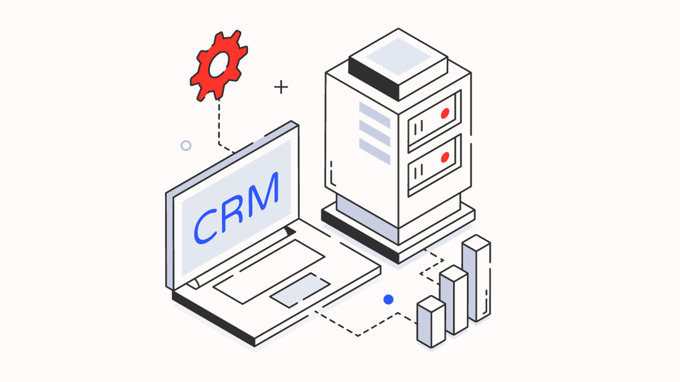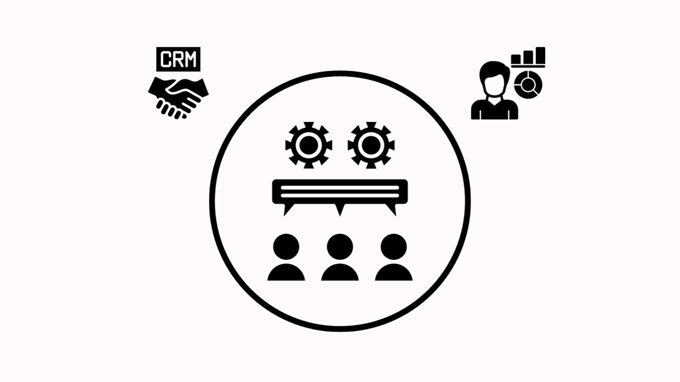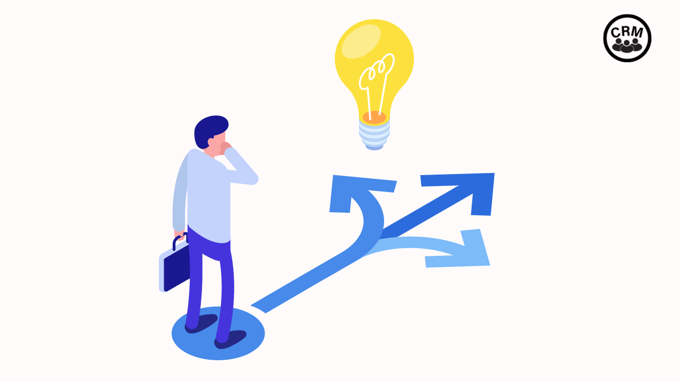An Ultimate Guide for Selecting the Best CRM for Manufacturing
Discover the power of CRM for manufacturing with our ultimate guide. Navigate through key expert insights to choose the best CRM for manufacturing...

Explore the benefits and challenges of CRM in this comprehensive guide. Gain valuable insights into optimizing customer relationships for business success.
Customer Relationship Management (CRM) is an important part of modern-day business strategies. It has transformed the way companies interact with their customers. CRM is a tool or software that helps in managing and nurturing relationships with customers. It allows them to organize, automate, and synchronize sales, marketing, customer service, and technical support.
As technology continues to evolve, the role of CRM in shaping customer experiences and driving business growth becomes increasingly popular. The primary goal of a CRM is to improve customer satisfaction and loyalty, which, in turn, helps increase profits for businesses.
CRM allows several benefits to businesses. Here are some of the advantages of such platforms.

Businesses can create a highly personalized customer experience by tailoring interactions based on customer preferences. This boosts customer satisfaction and fosters a sense of connection and loyalty.
CRM platforms strengthen communication and understanding between businesses and their customers. Proactive engagement through these platforms builds trust and allows organizations to gain valuable insights into customer needs and preferences.
By using CRM platforms, businesses can enhance customer loyalty through targeted strategies. These platforms enable organizations to identify and address the unique needs of individual customers. This improves customer retention.
CRM platforms streamline sales or marketing workflows and processes, which reduces manual efforts and automates repetitive tasks. This boosts overall productivity and allows employees to focus on more strategic, value-added activities. As a result, businesses can operate more efficiently and effectively.
CRM platforms contribute to the bottom line by identifying and capitalizing on high-value opportunities. Organizations can maximize revenue streams and optimize their profitability with improved sales and marketing efficiency. The strategic insights provided by CRM platforms empower businesses to make informed decisions that optimistically impact their financial performance.
Efficiency gains in data management and processes are among the most tangible benefits of CRM platforms. Businesses can achieve significant cost savings and time efficiencies by reducing manual effort and associated costs. This allows for a more agile and responsive approach to customer interactions and business operations.
CRM platforms provide robust data security measures, help businesses meet regulatory requirements, and adhere to data protection standards. This safeguards customer information and builds trust.
CRM platforms facilitate teamwork and information sharing across departments. This collaborative environment ensures that everyone in the organization is on the same page regarding customer interactions.
Integrating Artificial Intelligence (AI) in CRM platforms takes customer insights to the next level. By leveraging predictive analytics, businesses can anticipate customer needs, identify trends, and make data-driven decisions. AI-driven insights enhance decision-making.
Regardless of the numerous benefits of CRM platforms, there are still some challenges. Let’s look into them in detail.

Siloed data exists where customer information is scattered across various departments and systems. This fragmentation impedes gaining a holistic view of customer interactions and preferences. It hinders effective decision-making.
Manual data entry poses a significant challenge as it leads to potential errors and inconsistencies. Maintaining the accuracy and completeness of data becomes a constant struggle, impacting the reliability of insights derived from the CRM system.
Resistance to adopting CRM tools is a common hurdle. It often stems from a lack of understanding or apprehension about the technology. Overcoming this resistance requires thoughtful training programs and clear communication about the benefits and relevance of CRM in enhancing overall productivity.
Implementing CRM systems is met with resistance to change, as employees may be accustomed to existing processes. Integrating the new system with legacy systems can be complex, requiring meticulous planning and communication to ensure a smooth transition.
Poor data quality, resulting from inconsistent entry and maintenance practices, can be a persistent challenge. Ensuring data accuracy and completeness demands ongoing efforts to establish and enforce robust data management protocols.
User adoption hinges on effective training and onboarding processes. Difficulties in these areas can impede the realization of CRM benefits. This means that it becomes essential to address team members' concerns and provide adequate support during the transition.
The financial aspect is a significant challenge, encompassing both initial setup costs and ongoing maintenance expenses. Organizations must carefully assess the ROI of CRM platforms against the financial investment required to implement and sustain them.
Balancing the need for standardized processes with the demand for customization is a delicate task. CRM platforms must be flexible enough to adapt to evolving business requirements while maintaining a level of standardization that ensures consistency and efficiency.
Customer Relationship Management (CRM) systems come in various types. Here's an overview of the three main types of CRMs:
Operational CRM focuses on streamlining and enhancing day-to-day customer-facing activities. It plays a crucial role in managing customer interactions and automating key processes. Within operational CRM, we find the following components:

Sales Force Automation (SFA) is designed to streamline the sales process, from lead generation to closing deals. It automates tasks such as contact management, opportunity tracking, and sales forecasting, empowering sales teams to work more efficiently.
Marketing Automation is geared towards automating marketing processes. It includes campaign management, lead nurturing and analytics. Moreover, It enables businesses to create targeted and personalized marketing campaigns.
Service Automation focuses on enhancing customer support and service processes. It includes tools for managing customer inquiries, tracking service requests, and ensuring timely and effective issue resolution.
Analytical CRM leverages data analysis to gain insights into customer behavior, preferences, and trends. By harnessing the power of analytics, businesses can make informed decisions and optimize their strategies.
Data analytics tools provide businesses with reports and dashboards that comprehensively view customer interactions, helping them identify patterns and make data-driven decisions.
Furthermore, Analytical CRM allows businesses to segment their customer base based on various criteria. Businesses can tailor their marketing efforts by creating detailed customer profiles, improving customer satisfaction, and targeting specific demographics with personalized messages.

Collaborative CRM emphasizes communication and cooperation between different departments within a company to ensure a unified approach to customer interactions. The main components of collaborative CRM include interaction communication and channel integration. Collaborative CRM facilitates communication and interaction between teams, such as sales, marketing, and customer support. This ensures that all departments have access to up-to-date information about customer interactions.
Channel Integration integrates various communication channels into a centralized platform, such as email, social media, and phone. This integration enables businesses to manage customer interactions seamlessly across different channels.

In today's dynamic business landscape, selecting the right Customer Relationship Management (CRM) system is crucial for driving efficiency, enhancing customer relationships, and achieving sustainable growth. Here are some factors that can help businesses make an informed decision.

Before diving into CRM options, clearly define your business goals and specific requirements. Whether you are looking to improve customer engagement, streamline sales processes, or enhance marketing efforts, a thorough understanding of your objectives sets the foundation for selecting the right CRM features.
Moreover, evaluate the features offered by different CRM solutions and ensure they align seamlessly with your business objectives. Select a CRM that meets your specific requirements and offers the resources you need to succeed, whether your goals are lead management, analytics, or automation.

Choose a CRM system that is scalable and can evolve with your business. Consider future growth and ensure the CRM can adapt to changing requirements. This way, you can prevent the need for frequent system migrations.
Additionally, anticipate the growth of your customer database and user base. Assess the CRM's capability to handle increased data and user loads without compromising performance.

Opt for a CRM with an intuitive and user-friendly interface. A design that is easy to navigate enhances user adoption and minimizes the learning curve for your team members.
Furthermore, consider the diverse skill sets of your team members. A user-friendly CRM solution for all levels of expertise ensures that everyone can leverage its functionalities effectively. This will help you maximize productivity across departments.

Assess the compatibility of the CRM with your existing business tools. A seamless integration with applications such as email platforms, marketing automation, and project management tools enhances overall efficiency. You should also consider the broader business ecosystem and evaluate how well the CRM integrates with other critical systems. A cohesive ecosystem ensures smooth data flow and communication between various departments.

Evaluate the ease of integration with your current software infrastructure. A CRM that seamlessly integrates with your existing tools reduces implementation time and minimizes disruptions to ongoing operations.
Moreover, efficient data flow and communication between different systems are paramount. Confirm that the CRM facilitates seamless integration. It will help you prevent data silos and ensure a unified view of customer information across the organization.

Gain a clear understanding of the CRM's cost structure and pricing plans. Consider factors such as user licenses, additional features, and potential scalability costs to avoid any hidden expenses.
While cost is a crucial factor, focus on the overall value the CRM brings to your business. Assess the affordability of the features provided, ensuring that the chosen CRM aligns with your budget while delivering the necessary tools for success.

The benefits of CRM are extensive, ranging from improved customer relationships to increased productivity. However, businesses must navigate challenges such as implementation costs and data quality issues to fully realize these benefits.
By addressing these challenges proactively, businesses can create a customer-centric culture that positions them for long-term success in an increasingly competitive market. Implementing a CRM system is not just a technological upgrade. It is a strategic move that, when executed thoughtfully, can revolutionize the way businesses connect with and serve their customers.

Discover the power of CRM for manufacturing with our ultimate guide. Navigate through key expert insights to choose the best CRM for manufacturing...

Easily choose the best CRM for your Consulting Firm in 2024 with our expert advice and guidance.

Explore the potential of HubSpot for financial services in our complete guide. Explore use cases and limitations of HubSpot in the financial services...